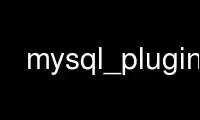
This is the command mysql_plugin that can be run in the OnWorks free hosting provider using one of our multiple free online workstations such as Ubuntu Online, Fedora Online, Windows online emulator or MAC OS online emulator
PROGRAM:
NAME
mysql_plugin - configure MariaDB server plugins
SYNOPSIS
mysql_plugin [options] plugin {ENABLE|DISABLE}
DESCRIPTION
The mysql_plugin utility enables MariaDB administrators to manage which plugins a MariaDB
server loads. It provides an alternative to manually specifying the --plugin-load option
at server startup or using the INSTALL PLUGIN and UNINSTALL PLUGIN statements at runtime.
Depending on whether mysql_plugin is invoked to enable or disable plugins, it inserts or
deletes rows in the mysql.plugin table that serves as a plugin registry. (To perform this
operation, mysql_plugin invokes the MariaDB server in bootstrap mode. This means that the
server must not already be running.) For normal server startups, the server loads and
enables plugins listed in mysql.plugin automatically. For additional control over plugin
activation, use --plugin_name options named for specific plugins.
Each invocation of mysql_plugin reads a configuration file to determine how to configure
the plugins contained in a single plugin library object file. To invoke mysql_plugin, use
this syntax:
mysql_plugin [options] plugin {ENABLE|DISABLE}
plugin is the name of the plugin to configure. ENABLE or DISABLE (not case sensitive)
specify whether to enable or disable components of the plugin library named in the
configuration file. The order of the plugin and ENABLE or DISABLE arguments does not
matter.
For example, to configure components of a plugin library file named myplugins.so on Linux
or myplugins.dll on Windows, specify a plugin value of myplugins. Suppose that this plugin
library contains three plugins, plugin1, plugin2, and plugin3, all of which should be
configured under mysql_plugin control. By convention, configuration files have a suffix of
.ini and the same basename as the plugin library, so the default configuration file name
for this plugin library is myplugins.ini. The configuration file contents look like this:
myplugins
plugin1
plugin2
plugin3
The first line in the myplugins.ini file is the name of the library object file, without
any extension such as .so or .dll. The remaining lines are the names of the components to
be enabled or disabled. Each value in the file should be on a separate line. Lines on
which the first character is '#' are taken as comments and ignored.
To enable the plugins listed in the configuration file, invoke mysql_plugin this way:
shell> mysql_plugin myplugins ENABLE
To disable the plugins, use DISABLE rather than ENABLE.
An error occurs if mysql_plugin cannot find the configuration file or plugin library file,
or if mysql_plugin cannot start the MariaDB server.
mysql_plugin supports the following options, which can be specified on the command line or
in the [mysqld] group of any option file. For options specified in a [mysqld] group,
mysql_plugin recognizes the --basedir, --datadir, and --plugin-dir options and ignores
others.
mysql_plugin Options
· --help, -?
Display a help message and exit.
· --basedir=path, -b path
The server base directory.
· --datadir=path, -d path
The server data directory.
· --my-print-defaults=path, -b path
The path to the my_print_defaults program.
· --mysqld=path, -b path
The path to the mysqld server.
· --no-defaults, -p
Do not read values from the configuration file. This option enables an administrator
to skip reading defaults from the configuration file.
With mysql_plugin, this option need not be given first on the command line, unlike
most other MariaDB programs that support --no-defaults.
· --plugin-dir=path, -p path
The server plugin directory.
· --plugin-ini=file_name, -i file_name
The mysql_plugin configuration file. Relative path names are interpreted relative to
the current directory. If this option is not given, the default is plugin.ini in the
plugin directory, where plugin is the plugin argument on the command line.
· --print-defaults, -P
Display the default values from the configuration file. This option causes
mysql_plugin to print the defaults for --basedir, --datadir, and --plugin-dir if they
are found in the configuration file. If no value for a variable is found, nothing is
shown.
With mysql_plugin, this option need not be given first on the command line, unlike
most other MariaDB programs that support --print-defaults.
· --verbose, -v
Verbose mode. Print more information about what the program does. This option can be
used multiple times to increase the amount of information.
· --version, -V
Display version information and exit.
COPYRIGHT
Copyright © 1997, 2013, Oracle and/or its affiliates. All rights reserved., 2013-2015
MariaDB Foundation
This documentation is free software; you can redistribute it and/or modify it only under
the terms of the GNU General Public License as published by the Free Software Foundation;
version 2 of the License.
This documentation is distributed in the hope that it will be useful, but WITHOUT ANY
WARRANTY; without even the implied warranty of MERCHANTABILITY or FITNESS FOR A PARTICULAR
PURPOSE. See the GNU General Public License for more details.
You should have received a copy of the GNU General Public License along with the program;
if not, write to the Free Software Foundation, Inc., 51 Franklin Street, Fifth Floor,
Boston, MA 02110-1301 USA or see http://www.gnu.org/licenses/.
Use mysql_plugin online using onworks.net services
